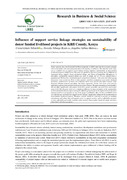| dc.description.abstract | Donor agencies have heavily funded livelihood programs in Kilifi County but these projects struggle with sustainability with some dying immediately the funding is withdrawn. The objective of the study was to establish how to support service linkage strategy influence sustainability of donor-funded livelihood projects in Kilifi County. The study was guided by Discovery Learning theory; Diffusion of Innovation theory; Lippitt’s theory of planned change; and Theory of Stakeholder Management. A descriptive correlational research design was used. A sample size of 170 was selected from a population of 295 from three livelihood projects using Slovin’s formula. 7 interviews and 3 focus group discussions were carried out. Prior to data analysis, statistical assumptions were tested. Standard deviations, standard error of means and arithmetic means were used for descriptive analysis while Pearson’s Product moment correlation and linear regression, F-tests, and t-tests were used for inferential analysis using statisticalpackage for social sciences. The mean perception of sustainability did not differ significantly with projects (p=0.192), gender (p=0.669), age (p=0.724), and marital status (p=0.284). However, there was a significant difference in mean perception of the sustainability of donor-funded livelihood projects among the different groups based on the highest level of education attained (p=0.011) and duration of stay in the project (p=000162). H0, r=0.383, p=0.000027<0.05 was rejected and concluded that support service linkages significantly influenced the sustainability of donor-funded livelihood projects. Therefore, policies should be reviewed to provide an enabling environment and culture that will support access to support services such as affordable extension services, affordable and readily available credit, markets. Future studies should use simple and direct Likert items with diverse projects... | en_US |
